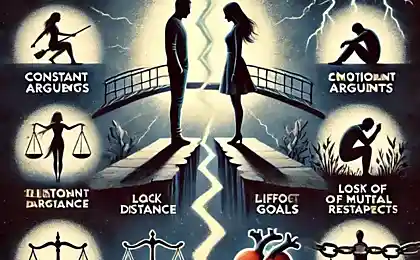159
Why are we getting into a relationship?
Ecology of life. Psychology: At first glance, this question seems very simple. But if we dig deeper, we find out. . .

Introduction: Why are we looking for a relationship?
At first glance, the answer to the question “Why do we get into a relationship?” seems obvious: we are looking for love, support and happiness. However, if you dig deeper, it becomes clear that there are complex psychological, biological and social mechanisms behind this. Why do some people seek relationships and others avoid them? What motivates us to find a partner? In this article, we will look at the main reasons that make us look for intimacy with other people.
Biological causes: instincts and hormones
Biologically, the desire for relationships is inherent in us. Here are a few key factors:
1. Procreation instinct
Humans, like other living things, are programmed to reproduce. Relationships are a way to find a partner to create a family and raise offspring.
2. Attachment hormones
Oxytocin, known as the “love hormone,” plays a key role in shaping emotional bonding between people. It stands out during hugs, kisses and other manifestations of intimacy.
3. Need for security
From an evolutionary perspective, relationships provide protection and support, which increases the chances of survival.

Psychological reasons: the need for love and acceptance
Beyond biology, our desire for relationships stems from deep psychological needs. Here are the main ones:
1. The need for love
Love is one of the basic human needs. We want to feel important and needed.
2. Finding meaning
Relationships often give life meaning. Taking care of another person and sharing goals make our lives more fulfilling.
3. Emotional support
In difficult times, we seek comfort and understanding. The partner becomes a support that helps to cope with difficulties.
Social causes: pressures and norms
Society also plays an important role in our desire for relationships. Here's how it manifests itself:
1. Social expectations
From childhood, we are taught that relationships are the “norm” of adulthood.
2. Fear of loneliness
In a society where couples are valued, loneliness is often seen as a failure.
3. Desire for belonging
Man is a social being. We strive to be part of a group and relationships help us feel included in society.

Ecology of Life: Healthy Relationships as Part of Harmony
Healthy relationships are not only about love, but also about the ecology of life. Here are a few principles that will help build harmonious relationships:
1. Balance between "I" and "we"
It’s important to maintain your identity even when in a relationship.
2. Mutual respect
Respect for your partner’s boundaries and needs is the foundation of a healthy relationship.
3. Open communication
Honesty and willingness to discuss issues help avoid misunderstanding.
Conclusion: Relationships as a way to yourself
Relationships are not just about finding a partner. It is the path to self-knowledge, personal growth and harmony. They help us understand who we are and what really matters to us. Whether you’re in a relationship or just looking for one, remember that the key is staying true to yourself and your values. Only then will the relationship become a source of joy, not stress.

Introduction: Why are we looking for a relationship?
At first glance, the answer to the question “Why do we get into a relationship?” seems obvious: we are looking for love, support and happiness. However, if you dig deeper, it becomes clear that there are complex psychological, biological and social mechanisms behind this. Why do some people seek relationships and others avoid them? What motivates us to find a partner? In this article, we will look at the main reasons that make us look for intimacy with other people.
Biological causes: instincts and hormones
Biologically, the desire for relationships is inherent in us. Here are a few key factors:
1. Procreation instinct
Humans, like other living things, are programmed to reproduce. Relationships are a way to find a partner to create a family and raise offspring.
2. Attachment hormones
Oxytocin, known as the “love hormone,” plays a key role in shaping emotional bonding between people. It stands out during hugs, kisses and other manifestations of intimacy.
3. Need for security
From an evolutionary perspective, relationships provide protection and support, which increases the chances of survival.

Psychological reasons: the need for love and acceptance
Beyond biology, our desire for relationships stems from deep psychological needs. Here are the main ones:
1. The need for love
Love is one of the basic human needs. We want to feel important and needed.
2. Finding meaning
Relationships often give life meaning. Taking care of another person and sharing goals make our lives more fulfilling.
3. Emotional support
In difficult times, we seek comfort and understanding. The partner becomes a support that helps to cope with difficulties.
Social causes: pressures and norms
Society also plays an important role in our desire for relationships. Here's how it manifests itself:
1. Social expectations
From childhood, we are taught that relationships are the “norm” of adulthood.
2. Fear of loneliness
In a society where couples are valued, loneliness is often seen as a failure.
3. Desire for belonging
Man is a social being. We strive to be part of a group and relationships help us feel included in society.

Ecology of Life: Healthy Relationships as Part of Harmony
Healthy relationships are not only about love, but also about the ecology of life. Here are a few principles that will help build harmonious relationships:
1. Balance between "I" and "we"
It’s important to maintain your identity even when in a relationship.
2. Mutual respect
Respect for your partner’s boundaries and needs is the foundation of a healthy relationship.
3. Open communication
Honesty and willingness to discuss issues help avoid misunderstanding.
Conclusion: Relationships as a way to yourself
Relationships are not just about finding a partner. It is the path to self-knowledge, personal growth and harmony. They help us understand who we are and what really matters to us. Whether you’re in a relationship or just looking for one, remember that the key is staying true to yourself and your values. Only then will the relationship become a source of joy, not stress.























